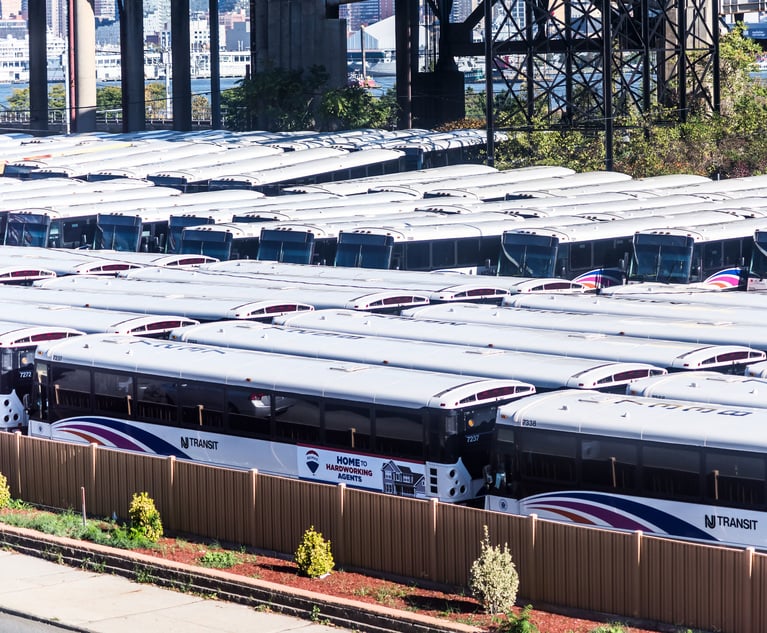In Opposition to Employee Misclassification Measure
The answer to the issues raised by Uber's business model does not lie in the change proposed by S-4204/A-5936.
December 15, 2019 at 10:00 AM
3 minute read
 Uber car
Uber car
The Legislature is considering bills to expand the definition of "employee" to extend minimum-wage, unemployment and other benefits to many individuals who otherwise would be deemed freelance workers. S-4204 and its Assembly counterpart, A-5936, remove one of the exceptions from New Jersey's long-standing "ABC" test established by N.J.S.A. 43:21-19(i)(6)(A)-(C) to distinguish employee from independent contractors. Under the test as it now stands, an individual who performs services for remuneration is deemed an employee unless: (a) the individual is "free from control or direction" in the performance of the work; (b) the services performed are "outside the usual course of the business for which such service is performed or … performed outside of all the places of business of the enterprise for which the services are performed;" and (c) the individual is "customarily engaged in an independently established trade, … or business of the same nature as" the work performed.
S-4204 and A-5936 (which are virtually identical) would strike the phrase "performed outside of all the places of business of the enterprise" from the second prong of the test. The proposal is no doubt related to regulatory and legal challenges to Uber, which the Department of Labor claims owes the state more than $500 million in unemployment and disability insurance taxes since 2015. In addition, a lawsuit filed against Uber in 2017 by Jaswinder Singh, a driver for the ride-hailing service, is pending. Singh alleged that he and other Uber drivers should be classified as employees, not independent contractors, and consequently should be eligible for overtime benefits. The change to the "ABC" test proposed by the Legislature risks major dislocation to the freelance labor market and the "gig" economy. Removing the qualification that the work be performed outside the place of business could potentially bring in freelance writers, telephone solicitation agents, information technology consultants, and per diem attorneys into the definition of "employee." In addition, if the true purpose of the bills is to assist Uber drivers (among others), it may not even be required. Uber sets the pricing for the number of miles driven and regulates the drivers' activities in other ways. It therefore arguably exercises sufficient control under the first prong of the test for its drivers to be deemed employees.
Eliminating the "outside" aspect of the "ABC" test will discourage businesses from engaging independent contractors, thus seriously limiting opportunities for people to work in non-traditional settings. As if to admit the potential for disruption, the bills carve out two significant exceptions to its application: the state government and the construction industry. With respect to the latter, it is almost impossible to imagine construction without independent contractors. Freelance work has been a boon for many people. It allows the homebound to earn income; it enables individuals to tailor their working lives to suit their schedules or personal needs, and it assists in the development of new industries (ride-hailing, for example). The answer to the issues raised by Uber's business model may better be found in strengthening the language of the "control test" in N.J.S.A. 43:21-19(i)(6)(A). It does not lie in the change proposed by S-4204/A-5936.
Editorial Board Chairman Rosemary Alito recused from this editorial.
This content has been archived. It is available through our partners, LexisNexis® and Bloomberg Law.
To view this content, please continue to their sites.
Not a Lexis Subscriber?
Subscribe Now
Not a Bloomberg Law Subscriber?
Subscribe Now
NOT FOR REPRINT
© 2025 ALM Global, LLC, All Rights Reserved. Request academic re-use from www.copyright.com. All other uses, submit a request to [email protected]. For more information visit Asset & Logo Licensing.
You Might Like
View All

Judge Jablonski and Chief Justice Rabner Both Acted Completely Properly
4 minute read
In 2-1 Ruling, Court Clears Way for Decade-Old Wrongful Imprisonment Suit
5 minute read
Trending Stories
- 1Attorney Sanctioned $9K for Revealing Nude Photos, Other Info in Court Filing
- 2Shifting Battlegrounds in Administrative Law, From Biden to Trump II
- 3Bar Report - Jan. 13
- 4Newsmakers: Robert Collins, Barron Wallace Elected to Bracewell’s Management Committee
- 5Navigating the Shifting Sands of E-Discovery and Information Governance in 2025
Who Got The Work
Michael G. Bongiorno, Andrew Scott Dulberg and Elizabeth E. Driscoll from Wilmer Cutler Pickering Hale and Dorr have stepped in to represent Symbotic Inc., an A.I.-enabled technology platform that focuses on increasing supply chain efficiency, and other defendants in a pending shareholder derivative lawsuit. The case, filed Oct. 2 in Massachusetts District Court by the Brown Law Firm on behalf of Stephen Austen, accuses certain officers and directors of misleading investors in regard to Symbotic's potential for margin growth by failing to disclose that the company was not equipped to timely deploy its systems or manage expenses through project delays. The case, assigned to U.S. District Judge Nathaniel M. Gorton, is 1:24-cv-12522, Austen v. Cohen et al.
Who Got The Work
Edmund Polubinski and Marie Killmond of Davis Polk & Wardwell have entered appearances for data platform software development company MongoDB and other defendants in a pending shareholder derivative lawsuit. The action, filed Oct. 7 in New York Southern District Court by the Brown Law Firm, accuses the company's directors and/or officers of falsely expressing confidence in the company’s restructuring of its sales incentive plan and downplaying the severity of decreases in its upfront commitments. The case is 1:24-cv-07594, Roy v. Ittycheria et al.
Who Got The Work
Amy O. Bruchs and Kurt F. Ellison of Michael Best & Friedrich have entered appearances for Epic Systems Corp. in a pending employment discrimination lawsuit. The suit was filed Sept. 7 in Wisconsin Western District Court by Levine Eisberner LLC and Siri & Glimstad on behalf of a project manager who claims that he was wrongfully terminated after applying for a religious exemption to the defendant's COVID-19 vaccine mandate. The case, assigned to U.S. Magistrate Judge Anita Marie Boor, is 3:24-cv-00630, Secker, Nathan v. Epic Systems Corporation.
Who Got The Work
David X. Sullivan, Thomas J. Finn and Gregory A. Hall from McCarter & English have entered appearances for Sunrun Installation Services in a pending civil rights lawsuit. The complaint was filed Sept. 4 in Connecticut District Court by attorney Robert M. Berke on behalf of former employee George Edward Steins, who was arrested and charged with employing an unregistered home improvement salesperson. The complaint alleges that had Sunrun informed the Connecticut Department of Consumer Protection that the plaintiff's employment had ended in 2017 and that he no longer held Sunrun's home improvement contractor license, he would not have been hit with charges, which were dismissed in May 2024. The case, assigned to U.S. District Judge Jeffrey A. Meyer, is 3:24-cv-01423, Steins v. Sunrun, Inc. et al.
Who Got The Work
Greenberg Traurig shareholder Joshua L. Raskin has entered an appearance for boohoo.com UK Ltd. in a pending patent infringement lawsuit. The suit, filed Sept. 3 in Texas Eastern District Court by Rozier Hardt McDonough on behalf of Alto Dynamics, asserts five patents related to an online shopping platform. The case, assigned to U.S. District Judge Rodney Gilstrap, is 2:24-cv-00719, Alto Dynamics, LLC v. boohoo.com UK Limited.
Featured Firms
Law Offices of Gary Martin Hays & Associates, P.C.
(470) 294-1674
Law Offices of Mark E. Salomone
(857) 444-6468
Smith & Hassler
(713) 739-1250






